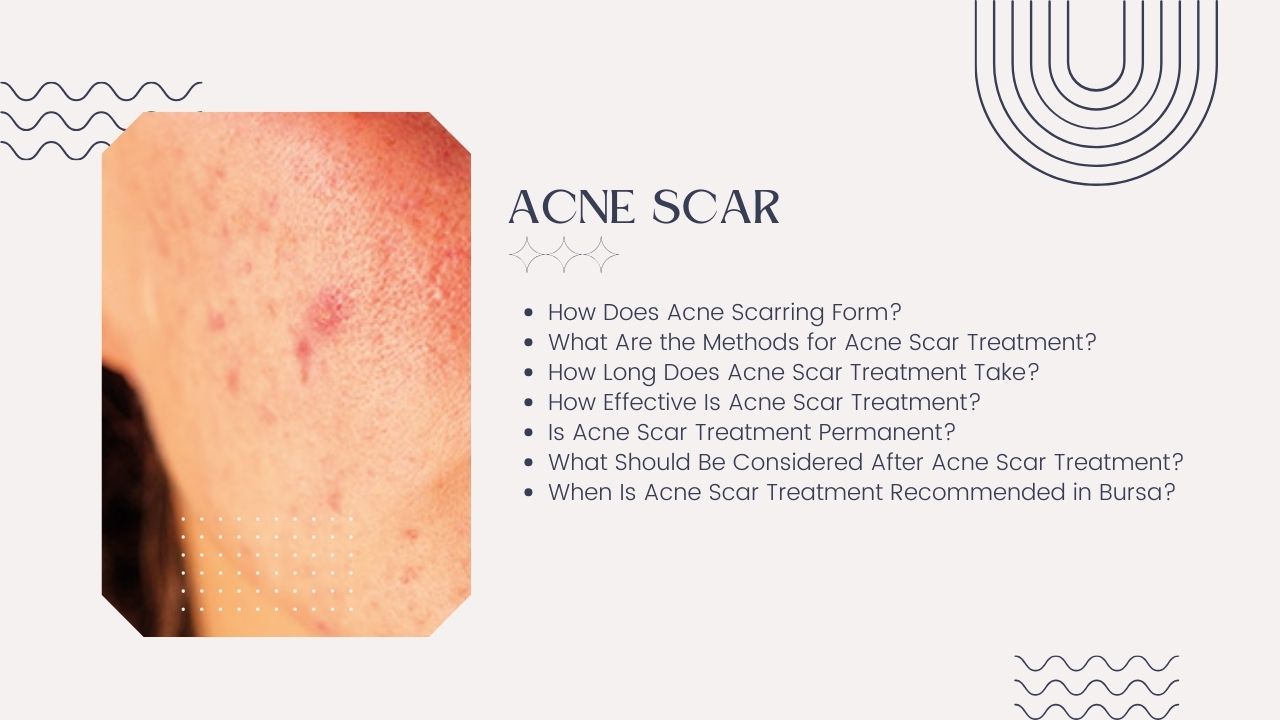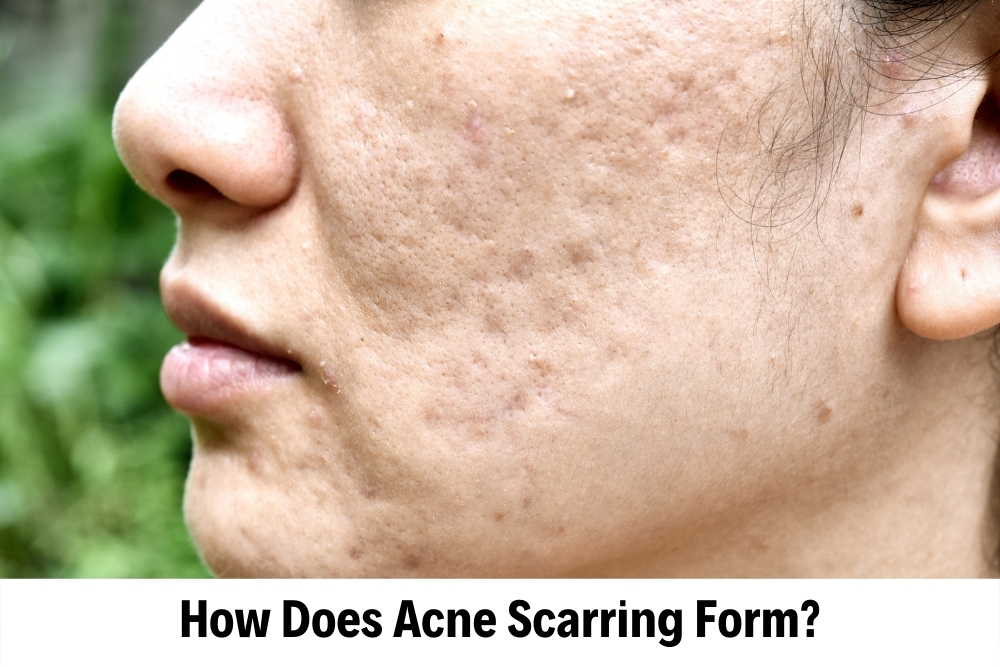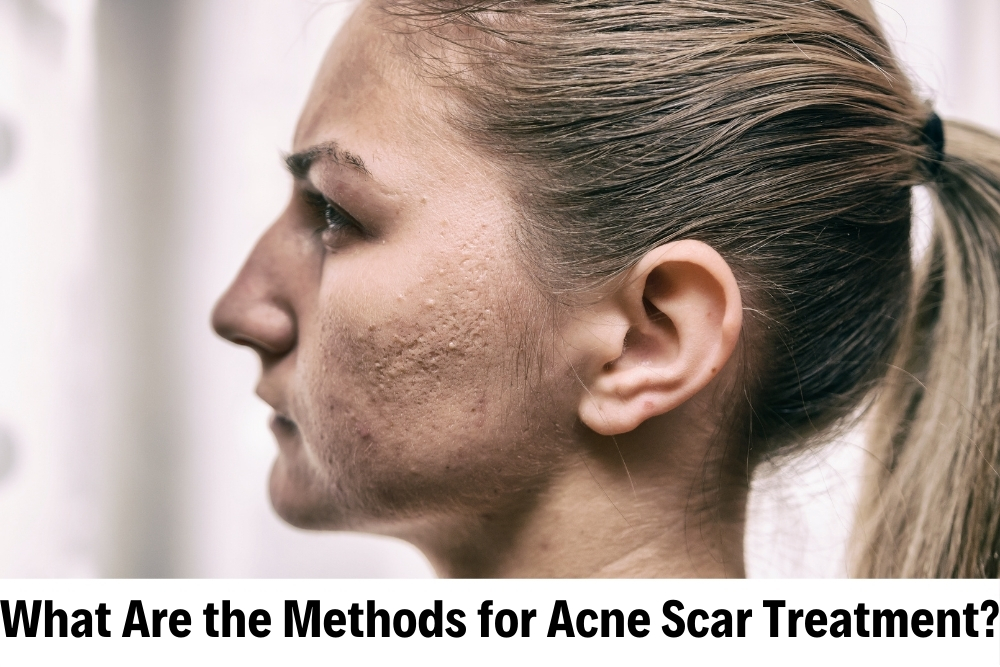Hello,
How Can We Help You?
Contact Form
Fill in the form and we will contact you as quickly as possible.
Contact us on Whatsapp
Scan with your camera app or click the QR code to start a conversation.



How Does Acne Scarring Form?
What Are the Methods for Acne Scar Treatment?
How Long Does Acne Scar Treatment Take?
How Effective Is Acne Scar Treatment?
Is Acne Scar Treatment Permanent?
What Should Be Considered After Acne Scar Treatment?
When Is Acne Scar Treatment Recommended in Bursa?
Acne scars typically form when acne damages the deeper layers of the skin or begins to heal before reaching the surface of the skin. Acne occurs when pores become clogged, and bacteria beneath the skin proliferates. Contributing factors to acne formation include the blockage of pores by sebum and dead skin cells.
When acne is popped or squeezed, it can damage the deeper layers of the skin, leading to the formation of scars. Acne scars often result from inadequate or excessive collagen production, leading to irregular skin texture or discoloration. While acne scars may fade over time, some cases may require treatment. Treatment options include laser therapies, chemical peels, microneedling, and dermal fillers.
Acne scars can manifest as irregularities and discolorations on or beneath the skin. There are several methods available for treating acne scars, including laser therapies, chemical peels, dermaroller or microneedling, dermal fillers, and dermabrasion.
Laser therapies are an effective method for reducing scars on the skin. By vaporizing the top layer of the skin, lasers reveal healthy skin cells underneath. Chemical peels, on the other hand, exfoliate the top layer of the skin to achieve a smoother appearance. Dermaroller or microneedling involves creating tiny punctures in the skin with fine needles, stimulating collagen production and promoting skin renewal.
Dermal fillers help to smooth the skin surface by filling in acne scars. Dermabrasion, meanwhile, involves scraping away the top layer of the skin to achieve a smoother skin texture. The choice of method for treating acne scars depends on the type, depth of scars, and the condition of the skin. Treatment options should be determined and administered by a specialist dermatologist or cosmetic surgeon.
The duration of acne scar treatment can vary depending on the type, depth of scars, and the chosen treatment method. Mild acne scars may heal with fewer sessions, while deeper or more pronounced scars may require more sessions. Laser treatments typically require several sessions, with specific intervals between each session.
For example, laser treatments are usually conducted over 3 to 5 sessions, with a 4 to 6-week interval between each session. Treatments such as chemical peels or dermaroller may also require several sessions. The duration and number of sessions depend on the condition of the scars and the individual's skin type.
The treatment process may last for a few months, with results becoming more apparent over time. The acne scar treatment plan should be personalized by a dermatologist or aesthetic expert based on the type of scars and the individual's skin condition. It's important to adhere to the recommended sessions regularly to enhance the effectiveness of the treatment.
The effectiveness of acne scar treatment can vary depending on the type of scars and the treatment method chosen. Mild acne scars may be more easily and successfully treated, while deeper or more pronounced scars may take longer to heal. The effectiveness of treatment depends on the chosen method, treatment duration, and the individual's skin type.
Laser treatments, chemical peels, dermaroller, or dermal fillers can be effective in reducing acne scars. These treatments help to correct skin irregularities and stimulate collagen production for skin renewal. However, the success of treatment may vary depending on the individual's skin structure and the depth of the scars.
To enhance the effectiveness of acne scar treatment, it's important to adhere to regular treatment sessions. Additionally, protecting the skin from the sun and practicing proper skincare after treatment can positively impact the results. While complete disappearance of scars may take a few months or longer, the treatment process generally significantly reduces the appearance of scars.
The results of acne scar treatment may vary depending on the type of scars and the chosen treatment method. While mild acne scars can often be successfully treated, it may be more challenging for deep or pronounced scars to completely disappear. The results achieved after treatment are generally long-lasting but are not typically termed "permanent."
Laser treatments, chemical peels, dermaroller, or dermal fillers can produce long-lasting effects and significantly reduce the appearance of scars. However, the results of acne scar treatment depend on factors such as the individual's skin type, response to treatment, and the depth of the scars. Protecting the skin from the sun and maintaining regular skincare after treatment can help preserve the results for an extended period.
Acne scar treatment can reduce the visibility of scars and contribute to smoother skin texture, but it does not provide a completely permanent solution. Maintaining regular care is essential for the complete disappearance of scars and long-term maintenance of results. Consulting a dermatologist or aesthetic specialist can provide more information about treatment results and help create a personalized treatment plan.

After acne scar treatment, it's important to consider several factors to ensure the success of the treatment and the healing of the skin. Some key points to consider after treatment include:
The skin may be sensitive after acne scar treatment. Using sunscreen is important to protect the skin from the harmful effects of the sun. Opting for a broad-spectrum sunscreen can protect the skin from both UVA and UVB rays.
Post-treatment skincare is essential. Moisturizing the skin with gentle and hydrating products suitable for your skin type is important. Avoiding products with excessive chemicals helps maintain the skin's natural balance.
The skin may be sensitive after treatment. Be cautious when choosing makeup products to prevent skin irritation. It's important to cleanse and moisturize the skin before applying makeup.
Regularly monitoring the condition of the scars post-treatment is important. Observing how the scars change during the healing process and maintaining communication with your doctor are important for tracking the results.
Attending to your overall health, maintaining a balanced diet, and adequate hydration can support the skin's healing process.
Following these steps carefully after treatment can help you achieve the best results from acne scar treatment. Being mindful in your skincare and daily routines can support your skin in staying healthy and smooth.

Acne scar treatment may be recommended to reduce the appearance of acne scars or to achieve smoother skin texture. Generally, acne scar treatment may be considered in the following cases:
People with deep or noticeable acne scars may consider treatment. These scars can negatively impact the appearance of the skin and diminish one's confidence.
Treatment may be considered for individuals with different types of acne scars, such as atrophic, keloid, or hypertrophic scars. Treatment options are determined based on the type and depth of scars.
Treatment may be recommended in cases where acne scars affect the skin's natural healing capacity. If the skin's natural healing process is insufficient or if scars are expected to be permanent, treatment may be considered.
If acne scars significantly affect an individual's overall aesthetic appearance and cause discomfort, treatment options may be evaluated.
The most suitable method and treatment plan for acne scar treatment are determined based on the individual's skin type, the condition of the scars, and their response to treatment. Consulting with a dermatologist or aesthetic specialist can help create a personalized treatment plan.
We'd love to hear from you. Please fill out the form.
Contact Form
Fill in the form and we will contact you as quickly as possible.
Contact us on Whatsapp
Scan with your camera app or click the QR code to start a conversation.